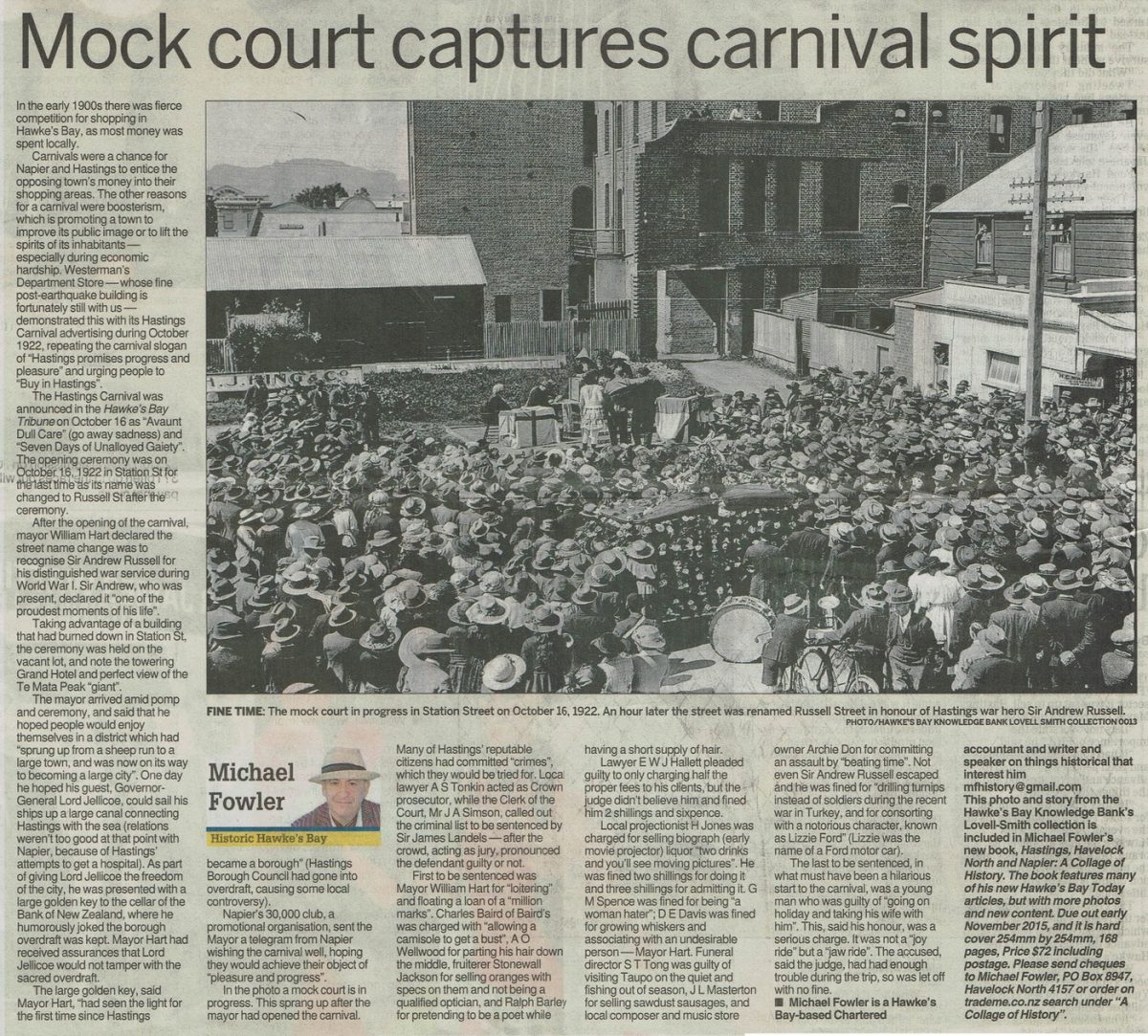Mock court captures carnival spirit
In the early 1900s there was fierce competition for shopping in Hawke’s Bay, as most money was spent locally.
Carnivals were a chance for Napier and Hastings to entice the opposing town’s money into their shopping areas. The other reasons for a carnival were boosterism, which is promoting a town to improve its public image or to lift the spirits of its inhabitants – especially during economic hardship. Westerman’s Department Store – whose fine post-earthquake building is fortunately still with us – demonstrated this with its Hastings Carnival advertising during October 1922, repeating the carnival slogan of “Hastings promises progress and pleasure” and urging people to “Buy in Hastings”.
The Hastings Carnival was announced in the Hawke’s Bay Tribune on October 16 as “Avaunt Dull Care” (go away sadness) and “Seven Days of Unalloyed Gaiety”. The opening ceremony was on October 16, 1922 in Station St for the last time as its name was changed to Russell Street after the ceremony.
After the opening of the carnival, mayor William Hart declared the street name change was to recognise Sir Andrew Russell for his distinguished war service during World War I. Sir Andrew, who was present, declared it “one of the proudest moments of his life”.
Taking advantage of a building that had burned down in Station St, the ceremony was held on the vacant lot, and note the towering Grand Hotel and perfect view of the Te Mata Peak “giant”.
The mayor arrived amid pomp and ceremony, and said that he hoped people would enjoy themselves in a district which had “sprung up from a sheep run to a large town, and was now on its way to becoming a large city”. One day he hoped his guest, Governor-General Lord Jellicoe, could sail his ships up a large canal connecting Hastings with the sea (relations weren’t too good at that point with Napier, because of Hastings’ attempts to get a hospital). As part of giving Lord Jellicoe the freedom of the city, he was presented with a large golden key to the cellar of the Bank of New Zealand, where he humorously joked the borough overdraft was kept. Mayor Hart had received assurances that Lord Jellicoe would not tamper with the sacred overdraft.
The large golden key, said Mayor Hart, “had seen the light for the first time since Hastings became a borough” (Hastings Borough Council had gone into overdraft, causing some local controversy).
Napier’s 30,000 club, a promotional organisation, sent the Mayor a telegram from Napier wishing the carnival well, hoping they would achieve their object of “pleasure and progress”.
In the photo a mock court is in progress. This sprang up after the mayor had opened the carnival. Many of Hastings’ reputable citizens had committed “crimes”, which they would be tried for. Local lawyer A S Tonkin acted as Crown prosecutor, while the Clerk of the Court, Mr J A Simson, called out Sir James Landels – after the crowd, acting as jury, pronounced the defendant guilty or not.
First to be sentenced was Mayor William Hart for “loitering” and floating a loan of a “million marks”. Charles Baird of Baird’s was charged with “allowing a camisole to get a bust’, A O Wellwood for parting his hair down the middle, fruiterer Stonewall Jackson for selling oranges with specs on them and not being a qualified optician, and Ralph Barley for pretending to be a poet while having a short supply of hair.
Lawyer EWJ Hallett pleaded guilty to only charging half the proper fees to his clients, but the judge didn’t believe him and fined him 2 shillings and sixpence.
Local projectionist H Jones was charged for selling biograph (early movie projector) liquor ‘two drinks and you’ll see moving pictures”. He was fined two shillings for doing it and three shillings for admitting it. G M Spence was fined for being “a woman hater”; D E Davis was fined for growing whiskers and associating with an undesirable person – Mayor Hart. Funeral director S T Tong was guilty of visiting Taupo on the quiet and fishing out of season, J L Masterton for selling sawdust sausages, and local composer and music store owner Archie Don for committing an assault by “beating time”. Not even Sir Andrew Russell escaped and he was fined for “drilling turnips instead of soldiers during the recent war in Turkey, and for consorting with a notorious character, known as Lizzie Ford” (Lizzie was the name of a Ford motor car).
The last to be sentenced, in what must have been a hilarious start to the carnival, was a young man who was guilty of “going on holiday and taking his wife with him”. This, said his honour, was a serious charge. It was not a “joy ride” but a “jaw ride”. The accused, said the judge, had had enough trouble during the trip, so was let off with no fine.
Michael Fowler is a Hawke’s Bay-based Chartered accountant and writer and speaker on things historical that interest him
mfhistory[@]gmail.com
This photo and story from the Hawke’s Bay Knowledge Bank’s Lovell-Smith collection is included in Michael Fowler’s new book, Hastings, Havelock North and Napier: A Collage of History. The book features many of his new Hawke’s Bay Today articles, but with more photos and new content. Due out early November 2015, and it is hard cover 254mm by 254mm, 168 pages. Price $72 including postage. Please send cheques to Michael Fowler, PO Box 8947, Havelock North 4157 or order on trademe.co.nz search under “A Collage of History”.
Photo caption –
FINE TIME: The mock court in progress in Station Street on October 16, 1922. An hour later the street was renamed Russell Street in honour of Hastings war hero Sir Andrew Russell.
PHOTO/HAWKE’S BAY KNOWLEDGE BANK LOVELL SMITH COLLECTION
Michael Fowler
Historic Hawke’s Bay












Do you know something about this record?
Please note we cannot verify the accuracy of any information posted by the community.